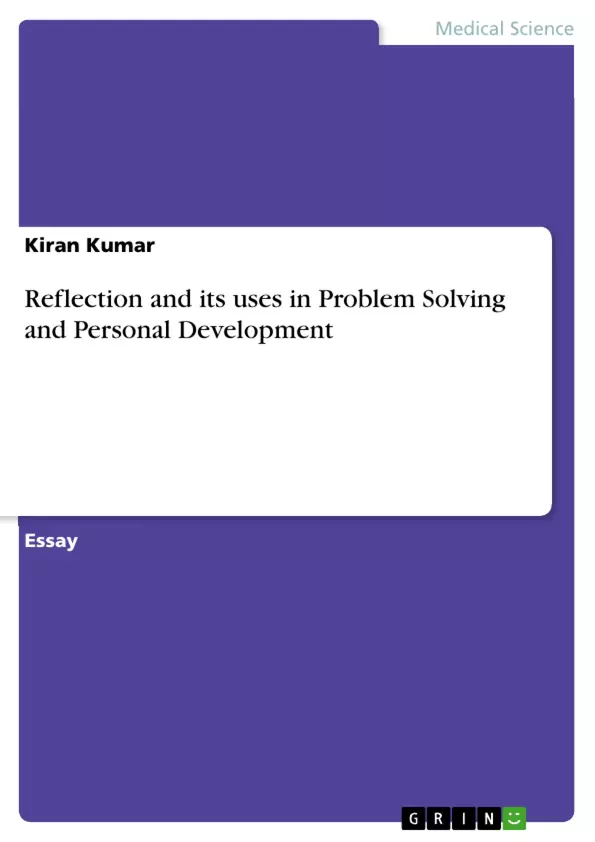This is an abstract on self development while deploying some of the models in reflective writing.
We learn by experiences which allow us to absorb what we read, hear and feel and help to do the activity and mainly interact with the people which help us to socialize. Reflection is a thinking of an extended period which are interlinked with the recent experience it also involves commonalities, differences and interrelation beyond their superficial elements reflection is a form of problem solving that chained several ideas together by linking with its predecessor in order to resolve the issues which are raised.
Table of Contents
- INTRODUCTION
- METHODOLOGY
- Reflective Enquiry
- Reflective Model Frame Work; (David Kolb-Experimental Learning)
- ANALYSIS
- CONCLUSION
- REFERENCES
Objectives and Key Themes
The objective of this text is to explore the process of reflection within the context of organizing modern healthcare services. It examines different reflective models and frameworks, demonstrating their application in analyzing personal experiences and fostering professional development within the medical field.
- The importance of reflection in professional development
- Application of reflective models (Gibbs, Kolb, Reflective Rational Enquiry)
- Linking theory and practice in healthcare settings
- Self-assessment and personal learning
- The role of reflection in problem-solving
Chapter Summaries
INTRODUCTION: This chapter introduces the concept of reflection as a process of learning from experiences, incorporating elements of what we read, hear, and feel, and highlighting its role in professional development, particularly in the medical field. It establishes a rationale for reflection, arguing that it's crucial for developing a balanced professional identity beyond just acquiring knowledge and skills. The chapter mentions various reflective models which will be explored later.
METHODOLOGY: This chapter details the reflective models employed in the self-assessment. It focuses on Reflective Rational Enquiry, describing its framework for self-improvement and personal learning. The chapter also introduces the David Kolb experimental learning model and Gibbs' reflective cycle, emphasizing their roles in structuring reflective writing and providing a systematic approach to analyzing experiences, identifying strengths and weaknesses, and planning for future improvement. It highlights the relative unfamiliarity of reflective practice in healthcare and mentions its potential as a useful tool.
Keywords
Reflection, Reflective practice, Healthcare, Professional development, Self-assessment, Gibbs reflective cycle, Kolb's experiential learning, Reflective Rational Enquiry, Medical practice, Personal learning, Problem-solving.
Frequently Asked Questions: A Comprehensive Language Preview
What is the purpose of this text?
This text explores the process of reflection within modern healthcare service organization. It examines various reflective models and frameworks, demonstrating their application in analyzing personal experiences and fostering professional development within the medical field. The goal is to highlight the importance of reflection for developing a balanced professional identity.
What are the key themes covered in this text?
The key themes include the importance of reflection in professional development, the application of different reflective models (Gibbs, Kolb, Reflective Rational Enquiry), the link between theory and practice in healthcare, self-assessment and personal learning, and the role of reflection in problem-solving.
What methodologies are used in this text?
The text employs several reflective models, primarily focusing on Reflective Rational Enquiry, David Kolb's experimental learning model, and Gibbs' reflective cycle. These models provide frameworks for structuring reflective writing and systematically analyzing experiences to identify strengths, weaknesses, and areas for future improvement.
What reflective models are discussed?
The text discusses and applies Gibbs' reflective cycle, Kolb's experiential learning model, and Reflective Rational Enquiry. Each model is explained and its application in healthcare professional development is illustrated.
What is the structure of this text?
The text is structured into an Introduction, Methodology, Analysis, Conclusion, and References sections. The Introduction sets the context, the Methodology details the reflective models used, the Analysis section presumably applies these models to experiences (though the content is not fully shown here), the Conclusion summarizes the findings, and References list the cited sources.
Who is the intended audience of this text?
While not explicitly stated, the intended audience appears to be healthcare professionals or students interested in professional development and the application of reflective practice in their field. The focus on self-assessment and personal learning strongly suggests a focus on individuals seeking improvement within their medical careers.
What are the key takeaways from this text?
The key takeaway is the significance of reflective practice in healthcare professional development. The text emphasizes the value of utilizing structured reflective models to analyze experiences, improve performance, and foster personal and professional growth. It highlights the relative lack of familiarity with reflective practice in healthcare and advocates for its increased adoption.
What are the keywords associated with this text?
Keywords include Reflection, Reflective practice, Healthcare, Professional development, Self-assessment, Gibbs reflective cycle, Kolb's experiential learning, Reflective Rational Enquiry, Medical practice, Personal learning, and Problem-solving.
Where can I find more information on the models discussed?
The provided preview doesn't include specific references. The complete text would contain a references section detailing the sources used for each model (Gibbs, Kolb, Reflective Rational Enquiry), allowing for further research on each model individually.
- Quote paper
- Mr Kiran Kumar (Author), 2016, Reflection and its uses in Problem Solving and Personal Development, Munich, GRIN Verlag, https://www.grin.com/document/323942



